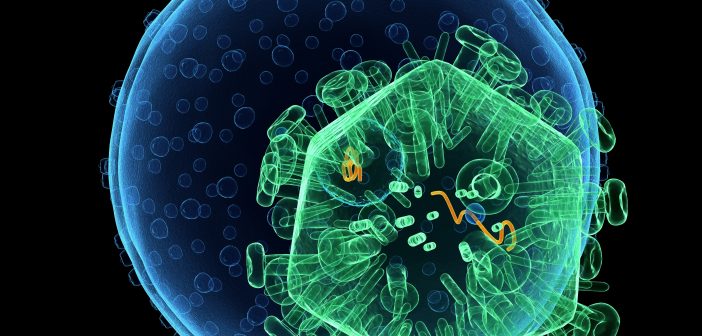HIV-1 remission following allogeneic stem cell transplant

An HIV-1-positive patient is in remission following treatment for Hodgkin’s Lymphoma with stem cells from an HIV-immune donor.
A London patient that received an allogeneic hematopoietic stem cell transplant to treat Stage IVB Hodgkin’s Lymphoma (HL) has been in remission for HIV-1 for 18 months. In a case report that will be published in Nature, researchers at UCL and Imperial College London (London, UK), together with teams at the University of Cambridge and the University of Oxford (both UK), transplanted cells that came from an international registry, and had one allelic mismatch and a homozygous mutation in the HIV coreceptor CCR5 (CCR5Δ32/Δ32).
Pretransplant, the patient underwent antiretroviral treatment, chemotherapy and immunosuppression. Following the transplant, full-donor chimerism was achieved from day +30, with patient resistance to HIV confirmed through challenging cells in vitro with the CCR5-tropic viruses Ba-L and ZM247. At day +77, the patient suffered grade 1 graft-versus-host-disease (GvHD), which was speculated by the treatment team to have contributed to reducing the HIV reservoir.
Total white blood cell count returned to pretransplant levels and antibody and T cell responses were analyzed to confirm absence of persistent HIV-I infection, indicating remission.
Learn more about HIV on our sister site, Infectious Diseases Hub >>
This method of inducing remission demonstrates that remission can be achieved without intense drug regimens and aggressive irradiation. However, longer-term follow up is required to ensure there is no relapse. This potentially expensive treatment is also not practical for the millions of patients around the world, but does offer clues that could eventually lead to a ‘cure’.
“At the moment the only way to treat HIV is with medications that suppress the virus, which people need to take for their entire lives, posing a particular challenge in developing countries,” said the study’s lead author, Professor Ravindra Gupta from the University of Cambridge, who led the study while at UCL, continuing “finding a way to eliminate the virus entirely is an urgent global priority”.
“While it is too early to say with certainty that our patient is now cured of HIV, and doctors will continue to monitor his condition, the apparent success of haematopoietic stem cell transplantation offers hope in the search for a long-awaited cure for HIV/AIDS,” said Professor Eduardo Olavarria from Imperial College Healthcare NHS Trust and Imperial College London.
Sources: Gupta RK, Abdul-jawad S, McCoy LE et al. HIV-1 remission following CCr5Δ32/Δ32 haematopoietic stem-cell transplantation. Nature. doi:10.1038/s41586-019-1027-4 (2019) (Epub ahead of print); www.cam.ac.uk/research/news/hiv-remission-achieved-in-second-patient